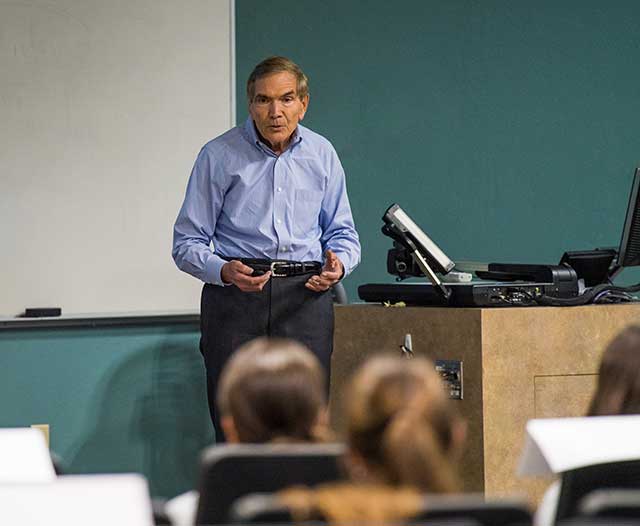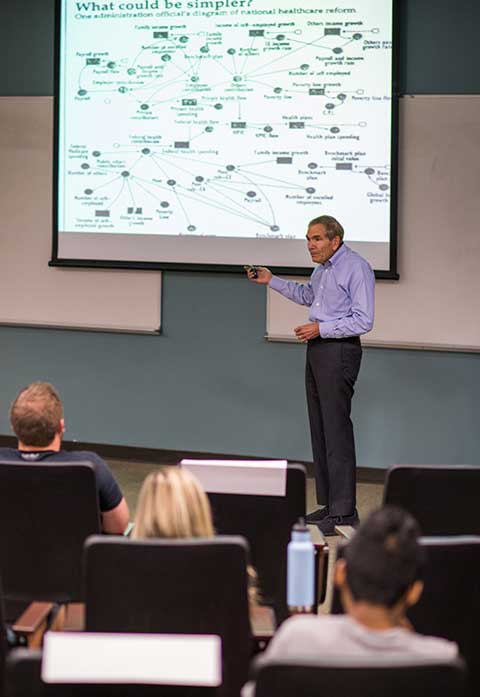It takes the expertise and experience of Southwest Florida’s greatest healthcare innovator to point out some light at the end of the increasingly dark tunnel of uncertainty created by the COVID-19 pandemic.
For almost 35 years, Jim Nathan oversaw the growth of a one-hospital operation along Cleveland Avenue in Fort Myers into the region’s dominant healthcare system anchored by four hospitals, known today as Lee Health, before retiring as its president and CEO in 2017. Since then, Nathan has spent some of his “retirement” — when he isn’t coaching, mentoring, advising various nonprofit organizations or serving on a local board, as he does with the FGCU Foundation — teaching a course titled “Healthcare from Economic, Social and Political Perspectives” at Florida Gulf Coast University.
Talk about a timely class. With the most catastrophic health crisis of our generation gripping the world in ways only a science-fiction writer could have previously imagined, Nathan sees through a more vivid lens than most to envision the good that will eventually sprout from coronavirus.

“One of the things I teach in my class is that major crises — while devastating during their intensity — always bring new rapid learnings, new technology and new opportunities. This will happen,” said Nathan, already a recipient himself of such necessary innovation in the form of the distance teaching he has embraced to keep his FGCU course meeting every week while on-campus classes are suspended.
“Just as we will see more distance-learning technology evolve, we will see more telemedicine, more delegation of various clinical duties, new types of clinical and operational leadership, and many new programs, services and products impacting how we live and function well beyond medicine,” Nathan said. “We are in the eye of the storm, and we do not know how long or how totally devastating this will be. During these times, existing and new leaders will emerge who have the talents, energy and ability to set aside finger-pointing and focus on finding solutions.”
Nathan has always been about “finding solutions.” He is proud of the fact that much of the impetus behind Lee Health’s meteoric expansion under his guidance was to put it in position to serve the region’s significant underserved and underrepresented populations who can’t afford health care, because as Nathan put it during an interview earlier this semester, “If we didn’t do it, who would?” That kind of community-first leadership grew Lee Health into what it is today: the largest employer between Tampa and Miami with a workforce of more than 14,000 serving 2 million patients and doing $2 billion in business annually, all without any local taxpayer funding.

Lately, though, Nathan’s most accomplished solution has been his first successful virtual class — “The subject was Obamacare and Trumpcare, including the 60 attempts at ‘repeal and replace!’” Nathan shared — with several timely topics ahead before the semester ends.
“The students were quite adept at the technology; I was much more tentative,” Nathan explained. “Fortunately, FGCU has wonderful resources, including Dr. Diane Marks (senior instructional designer), who is impressive and helped me get through the class. I do a lot of small-group work, discussions, debates, presentations, etc., so learning how to go into separate ‘rooms’ and how to ‘drop in’ on student small-group discussions was new to me. While I still really like the face-to-face contact, given the global challenges and unknown journey, it is great that FGCU has such resources. In fact, Dr. Ann Cary (dean of the Marieb College of Health & Human Services) said to me last week, ‘We will make a convert out of you!’ as it relates to distance learning.”
This week’s class is a module called “Modern Epidemics.” “We have some impressive guests who will join the class remotely sharing their firsthand knowledge of gun violence, opioid addiction, obesity and suicide,” Nathan said. “Students will hear opening comments from each content expert and then select one of the experts to join for a more focused discussion. Then they will return to the class and share their learnings with all the other students.”
Next week, Nathan plans to host expertson the “clinical challenges facing our community related to COVID-19. I will also have an expert on simulation for these 20-something students to better understand the physical and visual challenges facing older adults,” he added.
Nathan shared that while the purpose of the class is to understand the history and complexities of the American health system, the structure of his class is designed to improve collaboration, listening, sharing, compromising and thinking skills of students. While they may be beyond him in distance-learning technology, he wants them to know that they are the future health leaders who must focus on finding solutions and improvements in this highly complex industry.